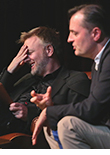Two leading architects talk about their divergent public policy views
Two of the world’s leading architects, Mark Foster Gage and Patrik Schumacher, discussed their sharply divergent views about built environment public policy April 21 at Rudder Theatre on the Texas A&M campus.
Their public appearance was the culmination of Interface, a daylong series of Department of Architecture events, that included an exhibit of studio work and an architectural review led by Gage and Schumacher. Interface was supported by the department’s Thomas A. Bullock Endowed Chair in Leadership and Innovation.
At Rudder Theatre, the dueling architects championed opposite sides of a spirited public land use discussion sparked by controversial notions Schumacher introduced in his keynote address at the 2016 World Architecture Festival in Berlin. A proponent of market-based urban policies and the sole partner at [Zaha Hadid Architects] (http://www.zaha-hadid.com) , one of the world’s most acclaimed firms, Schumacher called for the elimination of government-issued land use policies, public and affordable housing programs and he favored the privatization of public spaces such as parks and streets.
“All top-down, bureaucratic attempts to order the built environment via land use plans are pragmatically and intellectually bankrupt,” he said, adding that laws, practices, and regulations associated with land use plans stifle development and architectural creativity.
In reply, Gage, a pioneer in technology-based design who heads a New York-based [firm] (http://www.mfga.com) and serves as assistant dean and associate professor at the Yale School of Architecture, said “I disagree with almost everything [Schumacher] says, but discussions should ensue and he shouldn’t be so quickly personally villianized.”
Gage was also referring to salvos from a chorus of critics including Phineas Harper, deputy director of the Architecture Foundation and former deputy director of the Architectural Review.
“Schumacher is not a valuable provocateur,” said Harper. “He is not a refreshing new voice. His proposals lack anything approaching a thoughtful interrogation of the real world. They are like the views of an extremist blinded by ideology but given credence by a fawning architectural press.”
Gage and Schumacher’s discussion, moderated by Gabriel Esquivel, associate professor of architecture, allowed the audience to see the power of rational, reasoned arguments and compelling evidence, said Robert Warden, interim head of the [Department of Architecture] (http://dept.arch.tamu.edu) . “Their dialogue has been incredibly provocative, and we extended and promoted that exciting discussion,” he said.
Tags
- arch gallery
- architecture
- archone gallery
- coa gallery
- events
- exhibits
- landscape architecture & urban planning
- lectures
- planning
- rss
- studio projects
- undergraduate work
- video
Related Posts

Students rethink development plans for University Dr.

Students create new designs for children’s treatment center

Oct. 23 symposium spotlighted college, faculty research

Summit explored education advances with ‘smart’ cities
Follow Us
Facebook Twitter Vimeo Youtube Flickr RSS
Recent Posts

Planning prof heads study of disaster housing aid

A message from the dean

Former student remembered as expert planner

Leading educator named new head of Architecture Dept.



























_thumbnail_small.png)
